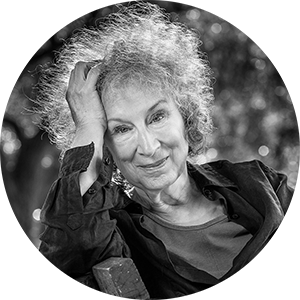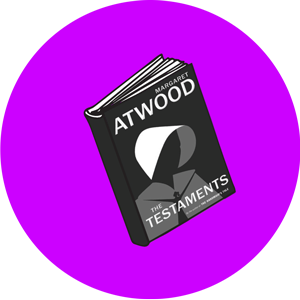Atwood Answers
Hello Deep Readers,
Welcome to our last installment of our four-part exploration of Margaret Atwood’s The Testaments. So much has happened in the world—and in all of our lives—since we launched this new program. We’re glad you’ve been along for the ride and hope The Deep Read has helped you engage with art and life in new and deeper ways.
From dystopias and how to read deeply, to feminism’s evolution since the 1980s, to the ways in which sci fi can help us understand intense social change, we’ve really dug into this novel, and we hope we’ve given you a new way of reading everything you might encounter.
Today, we’re excited to share Margaret Atwood’s exclusive interview with the UC Santa Cruz Deep Read Community. So many of you shared great questions for her, and offered such insightful observations along the way (highlights shared below). We think her responses are an illuminating way to close this chapter.

The Deep Read Interview
Dear Deep Read participants:
Thank you for choosing my novel. I hope you enjoyed yourselves, if that is the word… keep safe!
Very best,
Margaret Atwood

The Deep Read:The Deep Read is all about getting students and the broader community to, well, read deeply by asking questions, marking up passages and phrases, and considering new ways of interpreting texts. What is your approach to reading deeply?
Margaret Atwood: About the same as yours. As a long-time book reviewer, I also try to familiarize myself with previous books by the same author. And if it’s a book from some time ago, I try to find out what might have been happening when the author was writing the book. Were there political stresses? Were there certain things that could not be said, or were censored? (Religious at the time of Shakespeare, sexual in Victorian times.) Was there language that would not be used today that was common then? And vice versa? (The F word was once forbidden, whereas racial slurs were common. The reverse is now true.) And how about attitudes towards gender? Those have undergone a profound change. Even medical matters have to be taken into consideration … What once killed people that we now have vaccines for? And changing technologies … What was a “visiting card”? And clothing…. How to understand the codes embedded in it? And so forth.
The Deep Read: In our class (“Margaret Atwood’s Dystopia and the Present”), we read a lot of your own theorizations on utopian and dystopian thinking and literature, from your earlier essay, “Writing Utopia,” to your more recent one, “Dire Cartographies.” Your concept of ustopia gave us such a useful framework for reading The Handmaid’s Tale and Oryx & Crake and deepened our ability to engage with these novels, but we were not sure if it worked in the same way in The Testaments. Do you consider The Testaments to be an ustopian novel along the lines of your earlier fiction and, if so, where do you see the “little utopias” in this work?
Margaret Atwood: The little utopia is 1) in Canada, although it is not of course totally ideal, and 2) in the memories of Agnes about her childhood with Tabitha. But “utopia” can mean “no place,” so the absolutely perfect place may not really exist—which is why it has been situated somewhere else (cave, island, distant planet) or in the past (Golden Age, Wordsworth’s childhood, Poe’s “the kingdom by the sea,” etc.) What we have in real life is more often like: 1) Awful and 2) Better than that. We must remember though that societies we consider dystopic are pretty darn nice for some. (Those at the top.)
The Deep Read: We looked at The Testaments through the lens of feminism. We know from our reading of The Handmaid’s Tale that you have a hesitancy to affix feminist labels to your work, but we were wondering how feminism and feminist thinking informs The Testaments. Does the same assessment that you give in your most recent introduction to The Handmaid’s Tale apply to The Testaments as well, that the novel is “feminist” to the extent that “women are human beings—with all the variety of character and behavior that implies”? Or has your thinking on this question of feminism in your work changed or evolved in any way?
Margaret Atwood: It cannot be said too often: there are a great many “feminisms,” and many of them disagree with one another, sometimes violently. Compare the varieties of Christianity. It appears to be the nature of movements and religions to schism over time. Gilead has proposed itself as “helping girls and women,” and maybe it has in some ways: no more rape by random strangers, etc. So “freedom from” is freedom from that, among other things. But it comes at the price of “freedom to.” (Have a job, your own money, sexual choice, etc.) I’m sticking with “women are human beings,” with all the variety that entails, and “In a democracy all should have equal civil rights,” which doesn’t mean everybody is the same. I’m a novelist, not a theoretician. The novel is above all a form that describes human beings in action and reaction. All kinds of them.
The Deep Read: Ruben, a student in our class, writes: “From essays to books to the television show, we’ve spent hours analyzing and interpreting your writing. There’s no doubt that we missed references or allusions, but there’s also no doubt that we’ve read too far between the lines. What are your thoughts on the interpretation—or misinterpretation—of your work?”
Margaret Atwood: Dear Ruben, I have no control over it. The book, once it goes out into the world, is on its own. You may make of it what you will.
The Deep Read: Rebecca Mead’s recent New Yorker profile of you, which we read at the beginning of our course, calls you “the prophet of dystopia” in its title. Our hunch was always that you would not endorse such a label, given that you repeatedly say in various essays and introductions to your speculative fictional work that your fiction is historically grounded, that it doesn’t include anything that couldn’t possibly happen or hasn’t already happened in the historical past. Are we right?
Margaret Atwood: Yes. You are right. I am not a prophet, that is, I cannot predict the future. In the Biblical sense –denouncing people in power who behave badly – well maybe something there….
The Deep Read: Our interview with UC Santa Cruz Environmental Anthropologist Andrew Mathews highlighted a very helpful aspect of science fiction, or speculative fiction, that the form itself helps us, and is even crucial for us, to comprehend and grapple with drastic social or environmental change. What do you think about this assessment?
Margaret Atwood: Yes the sci fi writers have often hit the nail on the head before other people even knew there was a nail. They’ve been doing wipeout plague stories for over a century… just for instance.
The Deep Read: When it comes to understanding and surviving our present circumstances, what do the humanities offer us that other disciplines cannot?
Margaret Atwood: Brain scientists have told us that an in-depth novel (not an action/adventure) is the closest thing to lived experience that we can encounter. It presents us with whole-human-being characters, and is said to increase empathy. So we are not just looking at an experience from the outside, we are living it from inside the minds of the characters. Not only what the character did, but how the character felt.

Our Community
Since we launched this program, our Deep Read community has grown and we received many email reactions and thoughts each week. Here are some of our favorites:

Carol Pritchard-Martinez and Elizabeth Claussen were both curious about the structure of the novel. Elizabeth also unpacked a lot of structural themes, particularly Atwood’s deployment of triptychs. Meanwhile, Carol was interested in the interplay of collectivism vs individualism in the novel: “While The Testaments is clearly centered on women’s need to fight oppression through the assertion of free will, we cannot say that all acts of free will are good for society. Where do we draw the line?”
Tom Knight saw “the battle to overthrow patriarchal society” as a central concern of the novel and our current time.
Joel Biatch, referring to writings dating back to the founding of the modern nursing movement in the US at the end of the 19th century, said, “so long as women maintain organization, control and support there’s no limit to their power.”
Sonya Newlyn and Elizabeth Claussen did a lot of exploring on the meanings of the names in the novel. Beyond the biblical and cultural references in so many of the book’s names, Sonya points out, “the importance of names is also conveyed by the frequent assigning of them, who gets to assign them to whom or whether one is able to choose one for oneself.”
Angela Elsey posed a question very relevant to our times: “How do we, coming from our culture/religion/time, understand others who deeply believe things we find completely wrong?”

Next Chapter
Margaret Atwood was slated to visit earlier this month and have a conversation with writer and alumna, Kate Schatz. We’re still working out the details of Atwood’s eventual visit to UC Santa Cruz, but don’t miss this piece by Kate Schatz, who wrote an incredible assessment of the novel for the UCSC Magazine:
Atwood takes pains to present the banalities of evil, and to show how individuals can ignore, normalize, enable, and even co-create their own personal, political, and cultural demise. The Handmaid’s Tale and The Testaments depict a corrupt government and its traumatized citizens—but it’s also about how those citizens become complicit in creating the very systems that destroy them.
Thank you, Kate, for your thoughts here, and for your partnership!
Thank you to the Deep Read Team—the scholars and staff who contributed to this fruitful and engaging program. Thank you to the Helen and Will Webster Foundation for generously funding this project. Thanks to our campus and community partners for helping us launch this program with excitement. And thank you, Deep Readers, for reading and thinking deeply with us. There will be much more soon.
Stay attuned!
-The Deep Read
